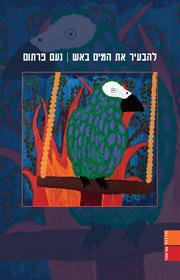Artikel
On Noam Partom’s poetics: Intertextuality and post-digital, electro-kook-hip hop-porno-steroids
A great wind is blowing

28 februari 2016
Love, it’s unbelievable:
Partom not only rides this wild horse – contemporary culture – she commands it. This too is a miracle, if you will.
The contrapuntal musicality of Partom’s sentences, her awareness of the history of Hebrew poetry, and the cunning way she winks at both high and street registers not only astonish; they are also natural in her hands. She is a daughter of her time. She may dialogue with Yona Wallach, Hezy Leskly and Sylvia Plath, with Nathan Alterman and with Homer at times, but the energy that moves her is the energy of the beat. Not only techno and rap, which seem her daily bread, but also the American beat poets and their spiritual father, the father of poetry of the great self:
Partom began as a spoken word poet, live and on YouTube. One might suspect that the transition to print would weaken her power. It seems that the opposite is the case. When her poems aren’t heard in her physical voice, an inner voice emerges, and in the absence of the anecdotal aspect of the Internet, it is possible to discern the beauty of the layers of her language.
[ . . . ]
Those whose hearts didn’t skip a beat when Julia Roberts kissed Richard Gere in Pretty Woman don’t have hearts, it would seem. Someone who doesn’t wipe away a tear with Noam Partom when she finds love, after 105 pages of loneliness, [ . . . ] is also lacking that organ. It's not a matter of literary quality, and yet it's completely about literary quality.
Partom has the ability to grip the heart amid the angry spray of her hyperbolic poetry rising over its banks. She has the ability to nail the the central human experience, to resuscitate longing and sorrow, and the destructive and joyful impulses that have motivated Adam and Eve since time began. She accomplishes this with the tools of intertextuality and the post-digital, electro-kook-hip hop-porno-steroids of her generation: [a sign of] literary prowess of the first rank.
A great miracle takes place in the third section of Partom’s splendid first book, Leh-havir et hamayim bah-esh (Setting the water on fire). The speaker finds true love:
Leopard stripes glow in the dark and the ground yawns ocean wide.
The avocado spread and the pastrami taste like kisses of meringue,
marzipan roses and warm chocolate goo,
because I love him and he loves me too.
The avocado spread and the pastrami taste like kisses of meringue,
marzipan roses and warm chocolate goo,
because I love him and he loves me too.
– trans. Danny Neyman
Love, it’s unbelievable:
Because after years of dissatisfaction, one-sidedness, jealousy
and sex that is sapping [ . . . ]
after years of lies and yuck schmuck narcissism sadism masochism
in a togetherness punctured and stinking with shame
after I almost lost faith that another man [ . . . ] might be possible and true
at long last I love and he does too,
he does too.
and sex that is sapping [ . . . ]
after years of lies and yuck schmuck narcissism sadism masochism
in a togetherness punctured and stinking with shame
after I almost lost faith that another man [ . . . ] might be possible and true
at long last I love and he does too,
he does too.
– trans. Danny Neyman
Partom not only rides this wild horse – contemporary culture – she commands it. This too is a miracle, if you will.
The contrapuntal musicality of Partom’s sentences, her awareness of the history of Hebrew poetry, and the cunning way she winks at both high and street registers not only astonish; they are also natural in her hands. She is a daughter of her time. She may dialogue with Yona Wallach, Hezy Leskly and Sylvia Plath, with Nathan Alterman and with Homer at times, but the energy that moves her is the energy of the beat. Not only techno and rap, which seem her daily bread, but also the American beat poets and their spiritual father, the father of poetry of the great self:
A great wind blows within me, and places me on the small stool by the stove,
the horizon-stuffing green of our block's well-groomed gardens burns my eye,
and I sing almightily the song of getting outa outa outa outa here –
feeling like Walt Whitman shouting his wild cry from the rooftops of the world –
the living call for freedom, rolling from his tongue to mine –
the horizon-stuffing green of our block's well-groomed gardens burns my eye,
and I sing almightily the song of getting outa outa outa outa here –
feeling like Walt Whitman shouting his wild cry from the rooftops of the world –
the living call for freedom, rolling from his tongue to mine –
– trans. Danny Neyman and Tamar Raphael
Partom began as a spoken word poet, live and on YouTube. One might suspect that the transition to print would weaken her power. It seems that the opposite is the case. When her poems aren’t heard in her physical voice, an inner voice emerges, and in the absence of the anecdotal aspect of the Internet, it is possible to discern the beauty of the layers of her language.
[ . . . ]
© Erez Schweitzer
Vertaler: Lisa Katz
Bron: Excerpted from a review in Haaretz,13 November 2012
Sponsors















